|
De Vlaamse dichter Guido Gezelle werd geboren in Brugge op 1 mei 1830. Zie ook mijn blog van 1 mei 2010 en verder alle tags voor Guido Gezelle.
Maak pompen van kanons
Maak pompen van kanons
en speiten van geweren,
al 't vechten is voorbij,
't is vrede weere in 't land.
De koning is gekommen!
De grote zon, de zomer is
ten oosten uitgeklommen,
bezoekende zijn koninkrijk...
De volkeren, de groten en
de klenen, alle lieden
hem koninklijk begroeten gaan
en blijde inkom bieden.
De mannen zijn veel sterker nu
ten arbeide, en de vrouwen,
ze slaan wel nog zo dapper, met
de la, de weefgetouwen.
De jongens en de maagden, als
of ze nog klene waren,
gaan lopen in de lanen, in
de locht, en spelevaren.
Het kindje, dat geen tonge en heeft,
nu zingen kan; en ‘t aaien
van moeders hand- en mondgebaar
vriendtoevig tegenkraaien.
De vogels zingen, de aarde zingt,
de kruiden en de blommen...
de zomer is, de grote zon,
de koning is gekommen!
Wierook
o Wierookgraan,
geronnen traan
van ceder- en van lorkenstammen,
gebedenbeeld,
daar ‘t vier in speelt,
en ‘t vonkelen van ‘s herten vlammen.
Geen gave van
fijn goud en kan
mijn hand de Heer, geen myrrha bieden,
maar wierook zal,
en overal
en allen dag, Hem dank bedieden.
o Wierookgraan,
in ‘t vier gedaan,
en rokende uit mijns herten midden,
van aards en grauw
wordt hemels blauw:
gaat, wierookgraan, de Here aanbidden!
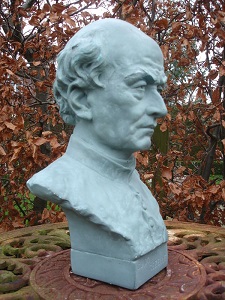
Guido Gezelle (1 mei 1830 – 27 november 1899)
Borstbeeld door J. Dommisse, 1e helft 20 eeuw
De Duitse dichter en schrijver Johano Strasser werd geboren op 1 mei 1939 in Leeuwarden. Zie ook alle tags voor Johano Strasser op dit blog.
Uit: Der Wind
Bei den Barmherzigen Schwestern springt er
Über den rostigen Schinkelzaun
Dreht ein paar
Kokette Pirouetten
Auf dem Kopfsteinpflaster und wisch!
Ist er weg der Hexenwind
Schwingt sich hinauf ins Lichtgewitter der Eichen
Berlin in den Siebzigern
Wir hatten zwar damals
Den Kopf voll mit anspruchsvollen Ansichten
Zu nahezu allem
Was in der Welt passierte
Aber für Luftnummern wie diese waren
Wir immer zu haben
Meinem Ur-Ur-Ur-Großvater mütterlicherseits
Setzte er zu auf der langen Steigung
Vor Recogne
(Oder war es vor Bar-le-Duc?)
Als er mit dem Planwagen aus dem flandrischen
Maldegem ins blühende Elsaß fuhr
Und dem Eisernen Gustav dem sie am Wannsee
Ein Denkmal gesetzt haben
Obwohl er doch nur in Paris
Eine Zufallsbekanntschaft besuchen wollte
Machte er den alten Fuchswallach wild
Auf den letzten Kilometern
Zurück nach Berlin
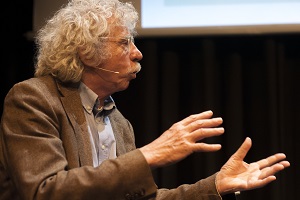
Johano Strasser (Leeuwarden, 1 mei 1939)
De Franse schrijfster Yasmina Reza werd geboren op 1 mei 1960 in Parijs. Zie ook alle tags voor Yasmina Reza op dit blog.
Uit: Heureux les heureux
« – Mais comment tu me parles ! Est-ce que tu réalises comment tu me parles ! Je dis, avance. Avance ! Rien ne m’agace plus que ces froissements subits, où tout s’arrête, où tout se pétrifie. Évidemment je pourrais dire, excuse-moi. Pas une seule fois, il faudrait que je le dise deux fois, avec le bon ton. Si je disais, excuse-moi deux fois avec le bon ton, on pourrait repartir à peu près normalement dans la journée, sauf que je n’ai aucune envie, aucune possibilité physiologique de dire ces mots quand elle s’arrête au milieu d’une travée de condiments avec un air ébahi d’outrage et de malheur. Avance Odile s’il te plaît, je dis d’une voix modérée, j’ai chaud et j’ai un article à finir. Excuse-toi, dit-elle. Si elle disait excuse-toi avec un timbre normal, je pourrais obtempérer, mais elle susurre, elle confère à sa voix une inflexion blanche, atonale, par-dessus laquelle je ne peux pas passer. Je dis s’il te plaît, je reste calme, s’il te plaît, de façon modérée, je me vois roulant à toute allure sur un périphérique, écoutant à fond Sodade, chanson découverte récemment, à laquelle je ne comprends rien, si ce n’est la solitude de la voix, et le mot solitude répété à l’infini, même si on me dit que le mot ne veut pas dire solitude mais nostalgie, mais manque, mais regret, mais spleen, autant de choses intimes et impartageables qui s’appellent solitude, comme s’appellent solitude le caddie domestique, le couloir d’huiles et vinaigres, et l’homme implorant sa femme sous les néons. Je dis, excuse-moi. Excuse-moi, Odile. Odile n’est pas nécessaire dans la phrase. Bien sûr. Odile n’est pas gentil, j’ajoute Odile pour signaler mon impatience, mais je ne m’attends pas à ce qu’elle fasse demi-tour les bras ballants vers les produits réfrigérés, c’est-à-dire vers le fond du magasin, sans un mot et laissant son sac à main dans le caddie. »
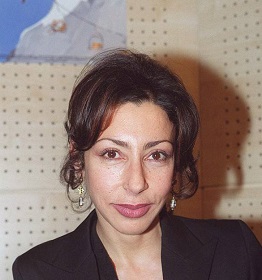
Yasmina Reza (Parijs, 1 mei 1960)
De Italiaanse schrijver Ignazio Silone werd geboren op 1 mei 1900 in Pescina dei Marsi. Zie ook mijn blog van 1 mei 2010 en verder alle tags voor Ignazio Silone.
Uit: Fontamara (Vertaald door J.-P. Samson)
« Les faits étranges que je vais vous rapporter ont eu lieu en 1930 à Fontamara. C’est une antique et obscure localité peuplée de paysans pauvres, sis au nord du lac asséché de Fucino, dans la Marsica, à l’intérieur d’une vallée, à mi-côte entre les collines et la montagne…Fontamara ressemble, en bien des points, à n’importe quel village méridional un peu isolé entre plaine et montagne, à l’écart des grandes voies de communication et, partant, un peu plus arriéré, misérable et abandonné que les autres… De la même façon, tous les paysans pauvres, les hommes qui font fructifier la terre et souffrent de la faim, fellahs, coolies, péons, moujiks, afoni, se ressemblent dans tous les pays du monde ; ils sont, sur toute la face de la terre, une nation à part, une race à part, une église à part ; et pourtant on n’a encore jamais vu deux pauvres en tous points identiques…. L’échelle sociale, à Fontamara, ne connaît que deux échelons : la condition des cafoni, à ras du sol, et, un peu lus au-dessus, celle des petits propriétaires. Sur ces deux mêmes échelons se répartissent aussi les artisans : un petit peu au-dessus, les moins pauvres, ceux qui ont une échoppe, et quelques outils primitifs ; tout en bas les autres….
Je sais fort bien que le nom de « cafone », dans le langage courant de mon pays, tant à la campagne qu’à la ville, est à présent terme d’offense et de mépris ; mais je m’en sers, dans ce livre, avec la certitude que lorsque, dans mon pays, la douleur aura cessé d’être une honte, ce même mot deviendra un nom de respect et peut-être aussi d’honneur….
Les plus fortunés d’entre les cafoni de Fontamara possèdent un âne, parfois un mulet. Arrivés à l’automne, après avoir péniblement payé les dettes de l’année précédente, il leur faut emprunter le peu de pommes de terre, de haricots, d’oignons, de farine de maïs indispensable pour ne pas mourir de faim pendant l’hiver….
IL n’y ajamais eu d’issue. Mettre de côté, en ces temps-là, vingt sous par mois, trente sous par mois, l’été jusqu’à cent sous par mois, cela pouvait faire comme économies une trentaine de lires au total. Et elles étaient tout de suite parties : pour les intérêts d’une traite ou pour l’avocat, ou pour le curé, ou encore pour le pharmacien.Et l’on recommençait du commencement au printemps suivant… »
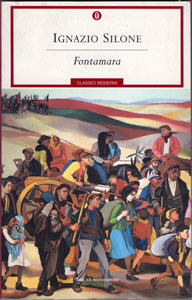
Ignazio Silone (1 mei 1900 – 22 augustus 1978)
De Amerikaanse schrijver Joseph Heller werd geboren in New York op 1 mei 1923. Zie ook alle tags voor Joseph Heller op dit blog.
Uit: Closing Time
“He was a rambunctious and impulsive Armenian, often a little bit frightening, unable to learn how to navigate in the accelerated course thrown at him unexpectedly in operational training at the air base in Columbia, South Carolina, where a group of us had been brought together as a temporary crew to train for combat and fly a plane overseas into a theater of war. The pilot was a sober Texan named Appleby, who was very methodical and very good, God bless him, and the two were very quickly not getting along. My feelings lay with Yossarian, who was humorous and quick, a bit wild but, like me, a big-city boy, who would rather die than be killed, he said only half jokingly one time near the end, and had made up his mind to live forever, or at least die trying. I could identify with that. From him I learned to say no. When they offered me another stripe as a promotion and another cluster to my Air Medal to fly ten more missions, I turned them down and they sent me home. I kept all the way out of his disagreements with Appleby, because I was timid, short, an enlisted man, and a Jew. It was my nature then always to make sure of my ground with new people before expressing myself, although in principle at least, if not always with the confidence I longed for, I thought myself the equal of all the others, the officers too, even of that big, outspoken Armenian bombardier who kept joking crazily that he was really an Assyrian and already practically extinct. I was better read than all of them, I saw, and the best speller too, and smart enough, certainly, never to stress those points.
Inevitably, Yossarian got lost on every one of the night missions we flew in our operational training flights over South Carolina and Georgia. It became a joke. From the other enlisted crewmen I met in the barracks and mess hall, I learned that all of their bombardiers turned navigators got lost on all of their night training flights too, and that became another joke. The third officer in our crew was a shy copilot named Kraft, who, promoted to pilot overseas, was shot down by flak on a mission over Ferrara in northern Italy when his flight went over the bridge there in a second pass and was killed. Yossarian, the lead bombardier, who'd failed to drop the first time, got a medal for that one for going round the second time when he saw the others had missed and the bridge there was still undamaged.”
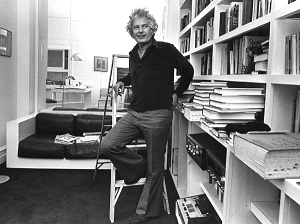
Joseph Heller (1 mei 1923 – 12 december 1999)
De Nieuwgriekse dichter Yánnis Rítsos werd geboren op 1 mei 1909 in Monemvasia. Zie ook mijn blog van 1 mei 2010 en verder alle tags voor Yánnis Rítsos.
Moonlight Sonata (Fragment)
We’ll pause for a little at the top of St. Nicholas’ marble steps,
and afterward you’ll descend and I will turn back,
having on my left side the warmth from a casual touch of your jacket
and some squares of light, too, from small neighbourhood windows
and this pure white mist from the moon, like a great procession of silver swans –
and I do not fear this manifestation, for at another time
on many spring evenings I talked with God who appeared to me
clothed in the haze and glory of such a moonlight –
and many young men, more handsome even than you, I sacrificed to him –
I dissolved, so white, so unapproachable, amid my white flame, in the whiteness of moonlight,
burnt up by men’s voracious eyes and the tentative rapture of youths,
besieged by splendid bronzed bodies,
strong limbs exercising at the pool, with oars, on the track, at soccer (I pretended not to see them),
foreheads, lips and throats, knees, fingers and eyes,
chests and arms and thighs (and truly I did not see them)
– you know, sometimes, when you’re entranced, you forget what entranced you, the entrancement alone is enough –
my God, what star-bright eyes, and I was lifted up to an apotheosis of disavowed stars
because, besieged thus from without and from within,
no other road was left me save only the way up or the way down. – No, it is not enough.
Let me come with you ...
I know it’s very late. Let me,
because for so many years – days, nights, and crimson noons – I’ve stayed alone,
unyielding, alone and immaculate,
even in my marriage bed immaculate and alone,
writing glorious verses to lay on the knees of God,
verses that, I assure you, will endure as if chiselled in flawless marble
beyond my life and your life, well beyond. It is not enough.
Let me come with you ...
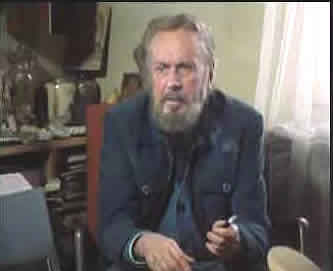
Yánnis Rítsos (1 mei 1909 — 11 november 1990)
De Hongaarse schrijver Antal Szerb werd geboren op 1 mei 1901 in Boedapest. Zie ook mijn blog van 1 mei 2010 en verder alle tags voor Antal Szerb.
Uit: Journey by Moonlight(Vertaald door Len Rix)
“Moving away from the Grand Canal, where their hotel stood, he arrived in the streets around the Frezzeria. Here at this time of night the Venetians promenade in large numbers, with the peculiar ant-like quality typical of the denizens of that city. They proceed only along certain routes, as ants do when setting out on their journeyings across a garden path, the adjacent streets remaining empty. Mihály too stuck to the ant-route, reckoning that the bars and fiaschetterie would surely lie along the trodden ways, rather than in the uncertain darkness of empty side-streets. He found several places where drinks were sold, but somehow none was exactly what he had in mind. There was something wrong with each. In one the clientele were too elegant, in another they were too drab; another he did not really associate with the sort of thing he was after, which would have a somehow more recherché taste. Gradually he came to feel that surely only one place in Venice would have it, and that he would have to discover on the basis of pure instinct. Thus he arrived among the back-alleys.
Narrow little streets branched into narrow little alleyways, and the further he went the darker and narrower they became. By stretching his arms out wide he could have simultaneously touched the opposing rows of houses, with their large silent, windows, behind which, he imagined, mysteriously intense Italian lives lay in slumber. The sense of intimacy made it feel almost an intrusion to have entered these streets at night.
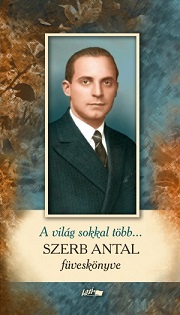
Antal Szerb [1 mei 1901 – 27 januari 1945)
Cover biografie
De Poolse schrijver en dichter Alexander Wat werd geboren op 1 mei 1900 in Warschau. Zie ook mijn blog van 1 mei 2010 en verder alle tags voor Aleksander Wat.
Uit: My Century: The odyssey of a Polish intellectual (Vertaald door Richard Lourie)
“We had no communist literature the entire time when I was in Lubyanka, no Marxist literature at all. I was in many cells where prisoners were given books, at least a few, and everyone confirmed that they were never given that sort of book. My fellow prisoners had a very intelligent explanation for that: it was simply to keep the investigators, who were not terribly intelligent, from being nailed to the wall by Marxist arguments. There was no shortage, however, of religious literature. I read Solovyov there and a great many others. I read the church fathers, St. Augustine on the Kingdom of God.
The books I read in Lubyanka made for one of the greatest experiences of my life. Not because they allowed me an escape but because, to a certain extent, they transformed me, influenced and shaped me greatly. It was the way I read those books; I came at them from a completely new angle. And from then on I had a completely new understanding, not only of literature, but of everything.
Literature is insight and synthesis, which means that poetry, ultimately, is heroic. Naked, weak, hungry, trembling, endangered by all the elements, all the beasts and demons, the cave men performed that act of heroism for consolation, in the deepest sense of the word. And at that time there in Lubyanka this seemed to me the essence of literature and the source of its legitimacy in the world. Consolation for a weak, naked cave man.”
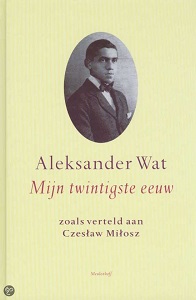
Aleksander Wat (1 mei 1900 – 29 juli 1967)
Cover Nederlandse vertaling
De Nederlandse dichter en schrijver Reinier van Genderen Stort werd geboren op 1 mei 1886 in Buitenzorg, Nederlands Indië.Zie ook alle tags voor Reinier van Genderen Stort op dit blog en ook mijn blog van 1 mei 2010.
Uit: Kleine Inez
“Zoo wekte het geen verwondering, toen het bewindvoerend reactionnair kabinet bij de vierjaarlijksche verkiezingen overwonnen werd, dat de koning hem belastte met de samenstelling van een nieuw college, waarvan hij als minister van Binnenlandsche Zaken, de door zijn aanhangers hartstochtelijk gevolgde, door zijn tegenstanders hartstochtelijk bestreden leider werd.
Hij kwam nu in den Haag wonen. Hij was veertig jaar, gezond en krachtig, had dus ternauwernood des levens middaghoogte bereikt en hij voelde zich behagelijk in het besef, dat hij zijn kracht eerst nu ganschelijk ontplooien kon. Middelerwijl was hij getrouwd geweest met de dochter van een welgesteld leidsch ambtgenoot, hoogleeraar in de godgeleerdheid, maar die een jaar reeds na haar huwelijk tengevolge van de bevalling eener dochter gestorven was. Hij had haar betreurd en beweend, want zij was zijn toegewijde echtgenoote geweest en naar waarheid had hij haar onderscheiding en genegenheid kunnen betoonen. Velen hadden hem een voorbeeldig echtgenoot geprezen en inderdaad, steeds had hij zijn echtelijke als zijn ambtelijke verplichtingen nauwkeurig vervuld. Wel is waar had hij haar door zijn veelvoudige werkzaamheden tijdens hun huwelijk eigenlijk weinig gesproken en ook in hun korten verlovingstijd, herinnerde hij zich later, hadden zij slechts enkele gesprekken gehad, waarin zij hem haar in strengheid en vroomheid geteelde ziel beschroomd had ontvouwd. Dan had hij verstrooid geluisterd, want de maatschappelijke en staatkundige vraagstukken, waarvan hij de oplossing zocht, lieten hem geen rust. Het had hem geschenen, dat zij de laatste maanden van hun huwelijk stiller was geworden, dan zij de eerste maanden geweest was en een of tweemaal had hij, haar toevalligerwijs aanziend, een zoo diepen blik ontmoet, dat hij, verwonderd, het hoofd had geheven. Maar dan had haar gezicht enkel de milde zorg gespiegeld hem in alles terwille te zijn en reeds, methodisch en onstuimig, was zijn geest voortgesneld in de baan, die hem langs de mijlpalen van studie en kunde tot macht en roem zou voeren.”
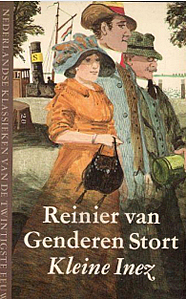
Reinier van Genderen Stort (1 mei 1886 – 7 januari 1942)
Cover
Zie voor nog meer schrijvers van de 1e mei ook mijn blog van 1 mei 2016 deel 2 en eveneens deel 3.
01-05-2017 om 11:20
geschreven door Romenu 
Tags:Guido Gezelle, Johano Strasser, Yasmina Reza, Joseph Heller, Yánnis Rítsos, Antal Szerb, Ignazio Silone, Aleksander Wat, Reinier van Genderen Stort, Romenu
|

